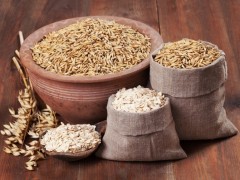Biggest Review Ever on Whole Grains and Blood Lipids
Whole grains have been considered to be healthy for a very long time.
Some of the health benefits of whole grains may be due to their effects on blood fats (cholesterol, triglycerides, etc).
However, the results of randomized controlled trials on the effect of whole grains on blood fats have been mixed (1).

A recent study assessed the effect of whole grains on blood fats by doing a meta-analysis, combining the results of many randomized controlled trials.
Hollander, et al. Whole-grain and blood lipid changes in apparently healthy adults: a systematic review and meta-analysis of randomized controlled studies. American Journal of Clinical Nutrition, 2015.
This study is the largest meta-analysis on the subject to date, and the only one that has distinguished between different grain types instead of just looking at “whole grains” as one big group.
Aim
The study aimed to assess the effect of whole grains on changes in blood fats, total cholesterol, LDL cholesterol, HDL cholesterol and triglycerides.
Methods
The researchers searched the literature for randomized controlled trials.
They screened 6069 articles for eligibility and included those that fulfilled certain criteria.
These criteria included:
- The study examined the effect of whole-grains, or diets rich in whole grains, on blood fats.
- The control group had a diet low in, or without, whole grains.
- The study focused on the grains themselves, not individual nutrients or dietary fiber.
Results
All in all, 24 randomized controlled trials with over 2275 participants were included.
Overall, the results of the analysis show that eating whole-grains causes the following changes in blood fats:
- A decrease in LDL (“the bad”) cholesterol (Weighted difference: – 0.09 mmol/L or -3.48 mg/dL).
- A decrease in total cholesterol (Weighted difference: -0.12 mmol/L or -4.68 mg/dL).
- A non-significant tendency to decrease triglycerides (Weighted difference: -0.04 mmol/L or -3.54 mg/dL).
- No change in HDL (“the good”) cholesterol.
When grain types were looked at individually, oats were responsible for most of the changes.
In comparison, other types of whole-grains had smaller or no significant effects.
Although eating whole grain oats was associated with a benefit, the study did not find a dose-response relationship, indicating that more is not necessarily better.
These results may be caused by the viscous beta-glucan fibers in oats, which have been shown to decrease total and LDL cholesterol in blood (2).
Barley and rye are also high in viscous fibers, such as beta-glucans. However, it was not possible to make any conclusions about barley and rye because of the few studies available.
Conclusions
The main conclusions of the study are:
- Eating oats may reduce the risk of heart disease by improving the composition of blood fats.
- In healthy people, other types of whole grains have smaller or no effects. It is not possible to draw conclusions about rye and barley due to a limited number of studies.
Limitations
This study only looked at the effects of whole grains in healthy adults. It is possible that they would have stronger effects in people with metabolic syndrome or a poor blood fat profile.
The study only looked at cholesterol, not lipoprotein markers like Apolipoprotein B or Apolipoprotein A1. These markers are more accurate predictors of cardiovascular risk than what was measured in the study.
Also, the study only looked at blood fats. It does not look at other health benefits of whole grains, such as blood sugar control, inflammatory markers or effects on weight loss.
What Do Other Studies Say?
The current study is the only meta-analysis that has investigated the effects of different whole grains on blood fats in a dose-dependent manner.
One other meta-analysis has examined similar studies, but it did not include as many studies as the current meta-analysis (3).
The results of that study were similar. It found that oats caused significant reductions in total cholesterol and LDL-cholesterol.
Real Life Applications
The blood-lipid lowering effects of whole grains are smaller than those achieved with medications.
Nevertheless, the effects are considered clinically relevant. This is particularly true of whole-grain oats.
Whole-grain oats can be recommended as a part of a heart-healthy diet, but the current evidence on other types of whole grains and blood fats is not impressive.




 The Community Food Security Coalition (CFSC) is a North American coalition of diverse people and organizations working from the local to international levels to build community food security.
The Community Food Security Coalition (CFSC) is a North American coalition of diverse people and organizations working from the local to international levels to build community food security.
 We have a diverse membership with almost 300 organizations from social and economic justice, anti-hunger, environmental, community development, sustainable agriculture, community gardening and other fields.
We have a diverse membership with almost 300 organizations from social and economic justice, anti-hunger, environmental, community development, sustainable agriculture, community gardening and other fields.
 We are dedicated to building strong, sustainable, local and regional food systems that ensure access to affordable, nutritious, and culturally appropriate food to all people at all times.
We are dedicated to building strong, sustainable, local and regional food systems that ensure access to affordable, nutritious, and culturally appropriate food to all people at all times.
 We seek to develop self-reliance among all communities in obtaining their food and to create a system of growing, manufacturing, processing, making available, and selling food that is regionally based and grounded in the principles of justice, democracy, and sustainability.
We seek to develop self-reliance among all communities in obtaining their food and to create a system of growing, manufacturing, processing, making available, and selling food that is regionally based and grounded in the principles of justice, democracy, and sustainability.
 The Coalition achieves its goals through a comprehensive blend of training, networking, and advocacy to further the efforts of grassroots groups to create effective solutions from the ground up.
The Coalition achieves its goals through a comprehensive blend of training, networking, and advocacy to further the efforts of grassroots groups to create effective solutions from the ground up.
